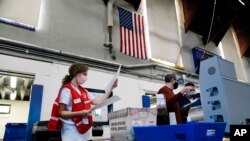As millions of Americans prepare to cast ballots in midterm elections that will determine which party controls both houses of Congress for the next two years, federal, state and local authorities have mobilized to ensure the democratic exercise is safe for all participants.
The efforts come as some election workers report attempts to intimidate them, including death threats, and as America continues to grapple with the aftermath of the Jan. 6, 2021 insurrection against Congress’ certification of the 2020 presidential election.
Election security is on voters’ minds, as well.
“I worry about people trying to harm voters or people working the elections,” said Lisa Watkins of Fairfax County, Virginia. Watkins who recently registered to vote, said American democracy is threatened if violence erupts on or after Election Day.
“I hope we don’t see any trouble at polling locations,” she added.
The November 8 midterms constitute the first nationwide elections since the 2020 presidential contest that saw then-President Donald Trump dispute Joe Biden’s victory, both in the courtroom and via other means. One of the most tumultuous periods in modern U.S. political history culminated with deadly riots at the Capitol. To this day, some Americans believe Biden is an illegitimate president, a festering falsehood that could fuel trouble in the midterm contests.
Federal task force
Last year, the U.S. Justice Department created a special task force to combat rising threats against election workers and voters.
Speaking in Washington last month, Assistant U.S. Attorney Kristen Clarke said the DOJ remains “steadfast in our commitment to making sure that all eligible voters can cast a vote; that all lawful votes are counted; and that every voter can cast a ballot free from discrimination and harassment.”
The Federal Bureau of Investigation (FBI) reports that U.S. states that saw significant upheaval over the 2020 presidential outcome have been more likely to spawn election-related threats.
Fifty-eight percent “of the total of potentially criminal threats were in states that underwent 2020 postelection lawsuits, recounts and audits, such as Arizona, Georgia, Colorado, Michigan, Pennsylvania, Nevada and Wisconsin,” the FBI said in August.
“I see data showing three in five election officials right now are saying, I don't feel comfortable or safe,” said Neal Kelly, who heads the Committee for Safe and Secure Elections, a non-governmental group made up of 32 current and former election and law-enforcement officials.
The organization is working with state and local communities to develop ways to prevent violence – threatened or actual – against voters, election officials and poll workers. For now, Kelly, a former registrar of voters for Orange County, California, is expressing cautious optimism.
“I think the election is going to be fine,” he told VOA. “But how does the mental stability hold up for voters as well as election officials?”
Kelly doesn’t advocate dispatching armed guards to voting locations but adds that law enforcement must be ready to respond promptly to any trouble that may arise. In addition, he says the federal government can do more in individual states to support safety training for poll workers and rebuild trust in America’s democratic exercises.
“Our goal is to get election officials and law enforcement together and talking and creating proactive plans to reduce the risk,” he said. “I think the long-term strategy is going to be how we change the optics, because the mechanics of running a secure election are just as important as the optics of running a secure election.”
Kelly added, “We've got to start educating voters about how secure the system is.”
Fewer election workers
Numerous state and local election officials have reported difficulties attracting poll workers for the midterm elections. A survey by the New York-based Brennan Center for Justice found that one in six election officials reported being threatened because of their job, and 77% said they felt such threats have increased in recent years.
“Since 2020, what election workers have been facing are unrelenting threats like having their homes invaded, their cars damaged and having their children threatened,” said Lawrence Norden, senior director of the Brennan Center’s elections and government program.
The study found nearly one in three poll workers know at least one colleague who has stepped down over concerns for their personal safety. “One of the things that worries me the most is election workers leaving the field,” Norden said in a CNN interview.
The study also found one in five election workers plans to leave their position before the 2024 presidential election.
“You’re seeing a lot of election officials leaving already,” Kelly said. “Election officials by and large are doing things to make sure workers are safe. This process is so important to democracy, and we need to stand up to make sure things are being done to ensure that security is in place,” said Kelly.
In some states, the federal government has launched programs to help train state poll workers. Efforts are also being focused on minority communities.
“We are trying to hire younger poll workers,” said Omar Sabir, a vice chairperson of the Philadelphia City Commissioners who oversees elections in Philadelphia County, Pennsylvania, where African Americans make up more than 40% of the population, according to the U.S. Census Bureau.
His recruitment efforts have been bolstered by offering pay raises and pledges of support.
“Poll workers and elections are the cornerstone of our democracy,” Sabir told VOA.
“I encourage people to become poll workers and not to be deterred from what happening out here.”
Steps to safeguard elections
New laws have been adopted in four states to protect election workers from harassment. In Colorado, the Election Official Protection Act toughens criminal penalties for intimidating election officials. It also makes it a crime to threaten election workers or publish their personal information online. In California, election workers will have the option to have their addresses and other personal information redacted from government records.
“With midterm elections nearing, the safety and peace of mind of hardworking election workers should be a top priority,” said California State Senator Josh Newman, who wrote the legislation that was signed into law last month.
In addition to protecting election workers, several states have taken steps to limit physical access to voting machines by unauthorized people and deployed enhanced cybersecurity measures at local election offices.
In recent months, U.S. cybersecurity experts have warned of a potential rise of insider threats from state and local officials who embraced former President Trump’s false claims that the election was stolen from him.
“We’re spending a lot of time reminding local election officials about their internal controls and having insider threat awareness,” said Kim Wyman, the U.S. Cybersecurity and Infrastructure Security Agency’s (CISA) senior election security adviser.
“Go back to those basic [security] protocols and make sure you have them in place,” said Wyman, who was responding to a question from VOA on the sidelines of a cybersecurity conference last month in Washington.





